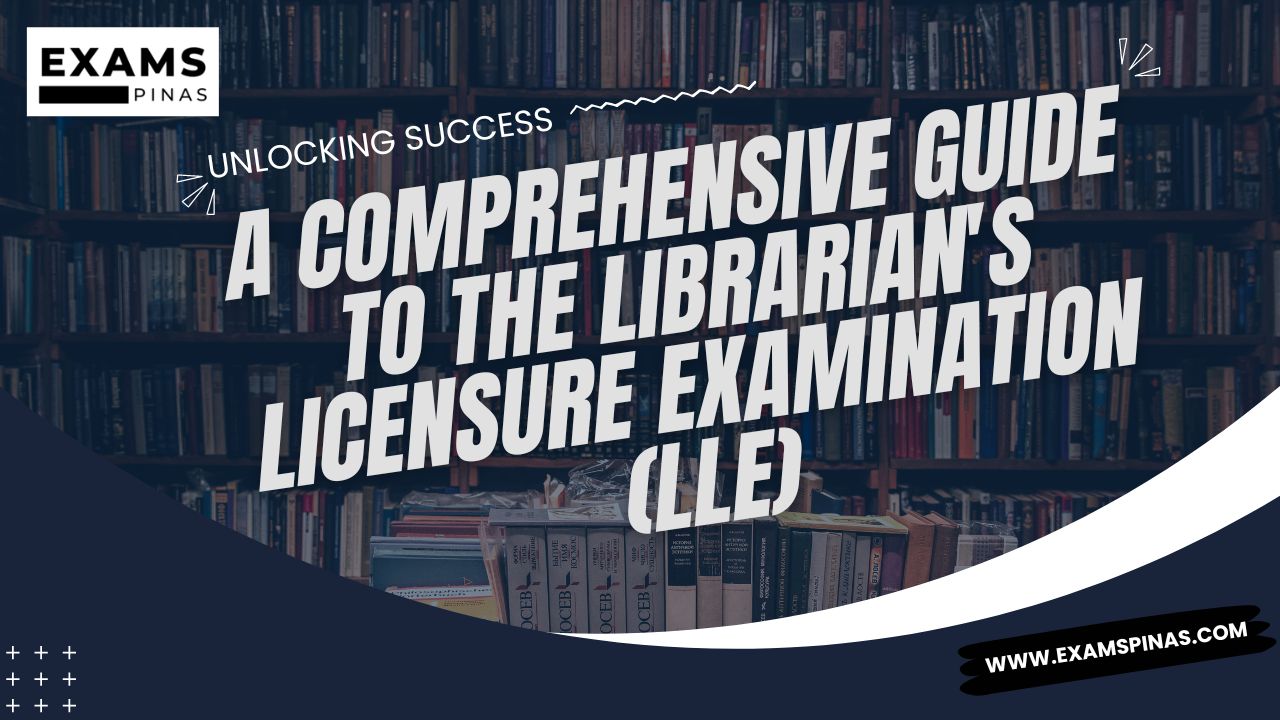Embarking on the journey to become a licensed librarian in the Philippines requires navigating through the intricacies of the Librarian’s Licensure Examination (LLE). This comprehensive guide aims to provide aspirants with a holistic understanding of the LLE, covering eligibility, the examination process, and a detailed overview of the subjects and weights involved.
Eligibility for the LLE
1. Academic Prerequisites
Prospective candidates must meet specific academic qualifications, holding either a Bachelor’s degree (BLIS) or a Master’s Degree (MLIS) in Library and Information Science. This educational foundation ensures a profound understanding of the theoretical and practical aspects of librarianship.
2. Age and Citizenship Criteria
The LLE has specific age requirements, emphasizing the need for candidates to possess the maturity required for the responsibilities of a librarian. Furthermore, only Filipino citizens are eligible to take the exam, highlighting the commitment to promoting local talent in the field.
LLE Examination Process
1. Application Procedure
The journey towards becoming a licensed librarian commences with the application for the LLE. Prospective candidates must gather essential documents, including academic records and proof of citizenship, and submit them through the online application system provided by the Professional Regulation Commission (PRC).
2. Application Fee
Understanding the financial aspect of the LLE is crucial. Candidates need to be aware of the associated application fee, with details available on the PRC website. Timely payment is imperative for the successful completion of the application process.
3. Examination Format
The LLE evaluates candidates through a comprehensive examination that tests their knowledge in library and information science. Understanding the format of the exam, including the types of questions and time management strategies, is essential for success.
Strategies for LLE Success
1. Thorough Academic Review
A successful LLE journey begins with a comprehensive review of academic foundations. Candidates should revisit key theories, practices, and advancements in library and information science to ensure they are well-prepared for the examination.
2. Practice with Past Exams
Familiarizing oneself with the structure of past LLE exams is a strategic approach to success. Practice exams provide candidates with insights into question patterns and help them refine their time management skills.
3. Seek Guidance from Experts
Engaging with experienced professionals in the field, such as professors or mentors, can be invaluable. Their guidance, advice, and additional resources can enhance preparation and boost confidence for the LLE.
Subjects and Relative Weights: Unveiling the Examination Scope
The LLE encompasses seven subjects, each carrying specific relative weights in terms of percentage, reflecting their significance in the practice of librarianship.
- Organization and Management of Libraries and Information Centers (30%)
- Fundamental principles of library administration.
- Strategic planning and resource optimization.
- Reference, Bibliography, and User Services (20%)
- Skills required for effective reference services.
- Curating bibliographies and catering to user needs.
- Selection and Acquisition of Library Materials (15%)
- Making informed decisions in selecting and acquiring library materials.
- Understanding collection development and acquisition policies.
- Cataloguing and Classification (15%)
- Proficiency in organizing and categorizing library resources.
- Indexing and Abstracting (10%)
- Skills in creating precise and informative indexes and abstracts.
- Information Technology (5%)
- Familiarity with information technology tools and systems.
- Laws and Practices Related to Librarianship (5%)
- Understanding legal and ethical dimensions of librarianship.
The cumulative weight of all seven subjects amounts to 100%, reflecting a balanced evaluation that encompasses the diverse skill set required for effective librarianship.
In conclusion, a thorough understanding of the scope, eligibility, and relative weights of the LLE subjects is crucial for candidates aiming to succeed in this professional examination. By focusing on the specific areas outlined and recognizing their respective significance, candidates can approach their preparation with precision and confidence. Success in the Librarian’s Licensure Examination is not just a goal; it is an achievable milestone for those who navigate this comprehensive guide with dedication and strategic preparation. Good luck on your path to becoming a licensed librarian!
For more detailed information and exam preparations, visit Examspinas.com

